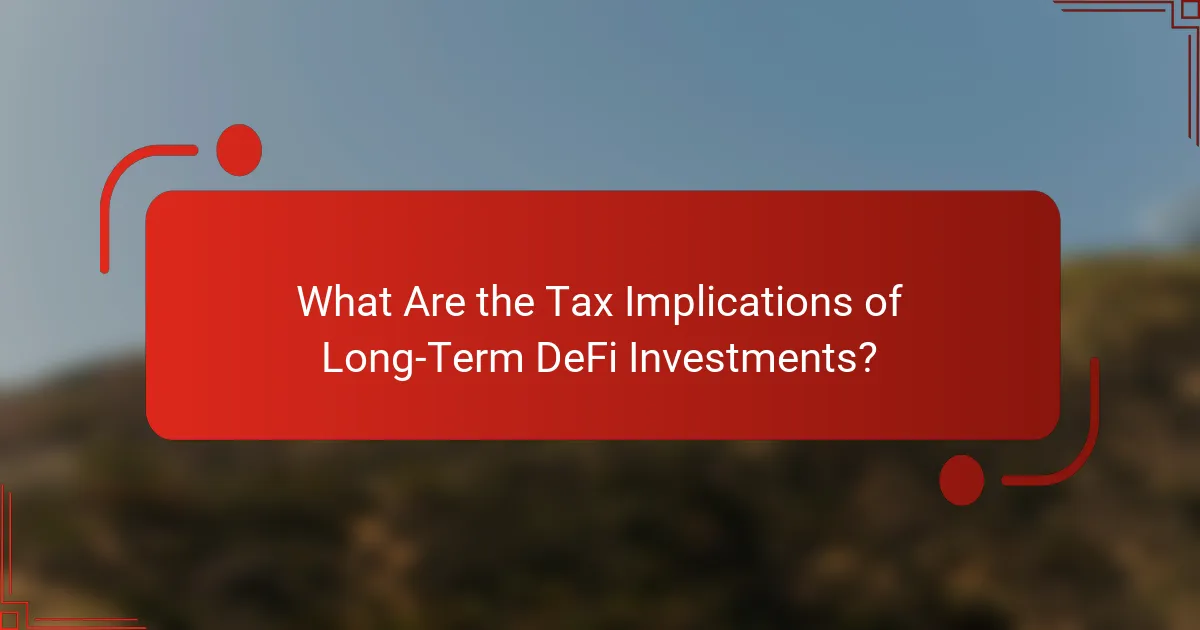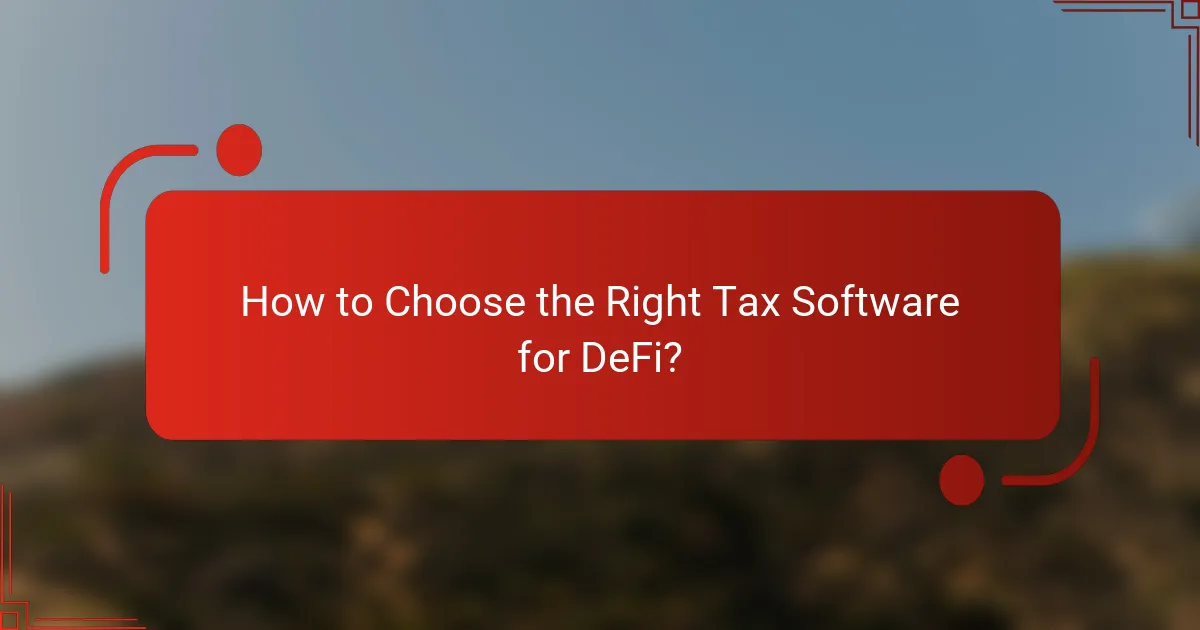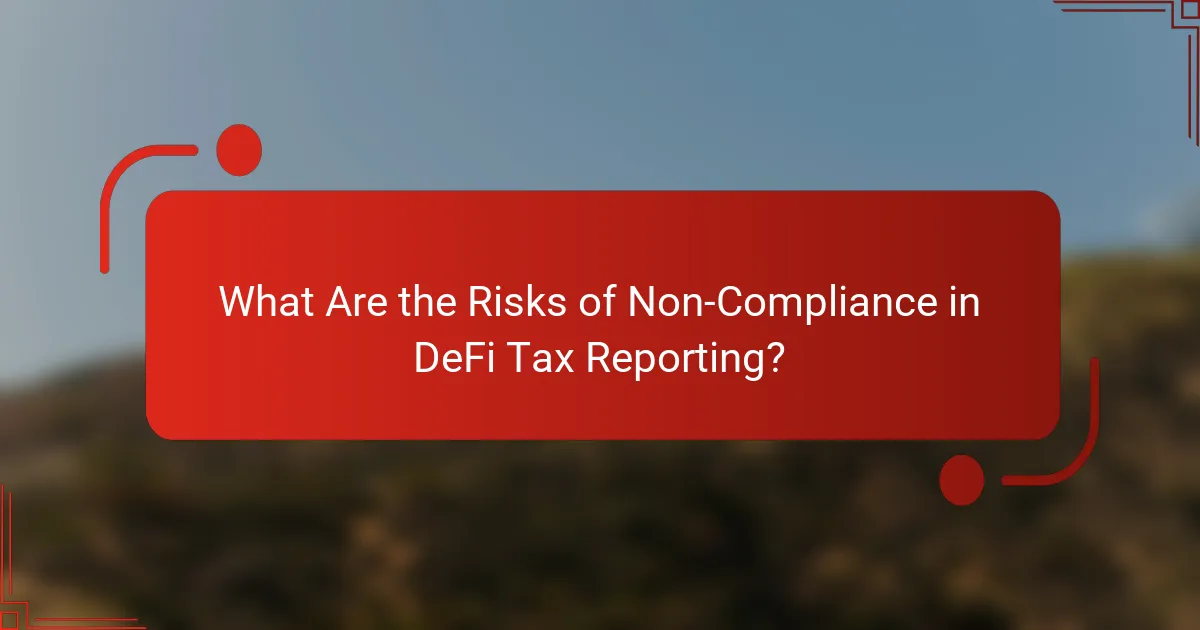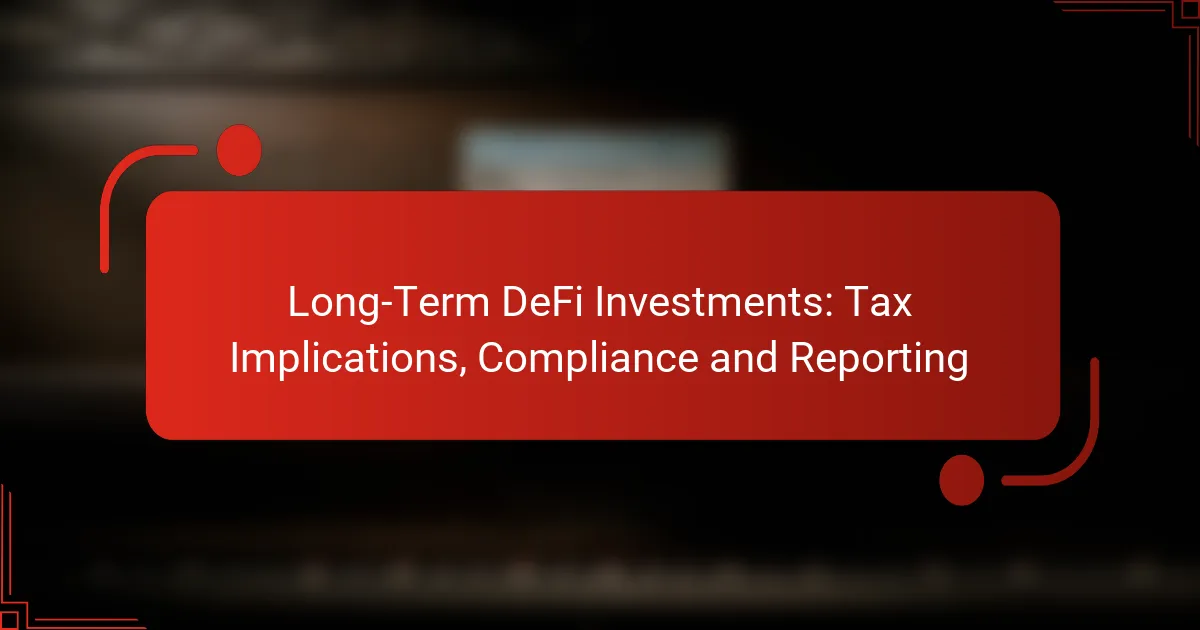Long-term DeFi investments can lead to complex tax implications, particularly concerning capital gains and income from staking rewards. To navigate these challenges effectively, investors must understand the legal framework governing cryptocurrencies and maintain meticulous records of their transactions for accurate reporting and compliance with tax regulations.

What Are the Tax Implications of Long-Term DeFi Investments?
Long-term DeFi investments can have significant tax implications, primarily related to capital gains and income from staking rewards. Understanding these tax responsibilities is essential for compliance and accurate reporting to avoid potential penalties.
Capital gains tax on profits
When you sell or exchange DeFi assets for a profit, you may be subject to capital gains tax. This tax applies to the difference between the purchase price and the selling price of the asset. In many jurisdictions, including the United States, long-term capital gains (for assets held over a year) are typically taxed at lower rates than short-term gains.
For example, if you bought a cryptocurrency for $1,000 and sold it for $3,000 after holding it for more than a year, you would owe taxes on the $2,000 profit. Rates can vary, so it’s advisable to check local regulations to determine the applicable tax rate.
Tax treatment of staking rewards
Staking rewards are generally considered taxable income at the fair market value when received. This means that if you earn rewards from staking your assets, you must report this income on your tax return. The value of the rewards is determined at the time they are credited to your account.
For instance, if you stake a cryptocurrency and earn rewards worth $100, you need to report that $100 as income. Keep accurate records of the staking rewards received, as this will help in calculating your taxable income and potential capital gains when you sell the staked assets.
Reporting requirements for DeFi transactions
Reporting requirements for DeFi transactions can be complex and vary by jurisdiction. Generally, you must report any trades, sales, or exchanges of cryptocurrencies, including those made through decentralized platforms. This includes documenting the date, amount, and fair market value of each transaction.
Many countries require taxpayers to disclose their cryptocurrency holdings and transactions on annual tax returns. Failing to report these transactions accurately can lead to audits or penalties, so it’s crucial to maintain detailed records of all DeFi activities and consult with a tax professional familiar with cryptocurrency regulations.

How to Ensure Compliance with DeFi Tax Regulations?
To ensure compliance with DeFi tax regulations, investors must understand the legal framework governing cryptocurrencies and maintain accurate records of their transactions. This involves adhering to guidelines set by tax authorities and implementing best practices for reporting income and capital gains.
Understanding IRS guidelines for cryptocurrencies
The IRS treats cryptocurrencies as property, meaning that transactions involving DeFi investments can trigger capital gains taxes. This includes trading, selling, or using cryptocurrencies for purchases. Investors should familiarize themselves with IRS Notice 2014-21, which outlines how to report these transactions.
It’s essential to track the fair market value of cryptocurrencies at the time of each transaction to accurately calculate gains or losses. This value will determine the taxable amount when you sell or exchange your assets.
Best practices for record-keeping
Maintaining thorough records of all DeFi transactions is crucial for compliance. Investors should document the date, amount, and purpose of each transaction, along with the fair market value at the time of the transaction. This information will be vital for accurate tax reporting.
Consider using spreadsheets or dedicated accounting software to organize your records. Regularly updating your records can help prevent errors and make tax season less stressful.
Using tax software for DeFi investments
Tax software designed for cryptocurrency can simplify the reporting process for DeFi investments. These tools often integrate with wallets and exchanges to automatically import transaction data, reducing the risk of manual errors.
When selecting tax software, look for features that support DeFi-specific transactions, such as staking, yield farming, and liquidity provision. Many platforms also offer tax-loss harvesting tools to help minimize tax liabilities.

What Are the Reporting Requirements for DeFi Investments?
Reporting requirements for DeFi investments primarily involve tracking capital gains and losses, as well as complying with federal and state tax regulations. Investors must accurately report their transactions to ensure compliance and avoid potential penalties.
Form 8949 for capital gains
Form 8949 is used to report capital gains and losses from the sale or exchange of assets, including those from DeFi investments. Each transaction must be listed individually, detailing the date acquired, date sold, proceeds, cost basis, and gain or loss. This form helps the IRS track your investment performance and tax liability.
For example, if you sold a DeFi token for a profit, you would report the sale on Form 8949, indicating the purchase price and the sale price to calculate your capital gain. Ensure that you keep detailed records of all transactions to support your entries.
Schedule D for reporting
Schedule D summarizes the information from Form 8949 and provides an overview of your total capital gains and losses. This form is submitted alongside your annual tax return and is essential for calculating your overall tax liability. It categorizes gains and losses into short-term and long-term, which are taxed at different rates.
When completing Schedule D, ensure that the totals from Form 8949 are accurately transferred to the appropriate sections. This helps the IRS verify your reported income and ensures you are taxed correctly based on your investment duration.
State-specific reporting obligations
In addition to federal requirements, many states have their own reporting obligations for DeFi investments. These can vary significantly, so it’s crucial to understand your state’s tax laws regarding capital gains. Some states may require additional forms or have different tax rates for investment income.
For instance, states like California have specific guidelines for reporting capital gains, while others may not tax them at all. Check with your state’s tax authority or a tax professional to ensure compliance and avoid surprises during tax season.

How to Choose the Right Tax Software for DeFi?
Selecting the right tax software for DeFi investments involves understanding your specific needs, including the types of transactions you engage in and the level of detail required for compliance. Look for software that integrates well with your wallets and exchanges, automates reporting, and provides accurate calculations based on current tax regulations.
Features to look for in tax software
When choosing tax software for DeFi, prioritize features such as integration capabilities with various wallets and exchanges, automated transaction tracking, and support for multiple cryptocurrencies. Additionally, ensure the software can generate tax reports that comply with local regulations, such as IRS guidelines in the U.S. or similar requirements in Europe.
Another important feature is the ability to handle complex transactions, including staking, yield farming, and liquidity provision. Look for software that can accurately calculate capital gains and losses, as well as any income generated from DeFi activities.
Popular tax software options for DeFi
Several tax software options cater specifically to DeFi investors. Some of the most popular include CoinTracker, which offers comprehensive tracking and reporting features, and Koinly, known for its user-friendly interface and strong integration capabilities. Both options support a wide range of cryptocurrencies and provide detailed tax reports.
Other notable mentions are TaxBit, which automates tax calculations and reporting, and CryptoTrader.Tax, which is designed for users who want a straightforward approach to tax reporting. Each of these platforms has unique strengths, so consider your specific needs and transaction types when making a choice.

What Are the Risks of Non-Compliance in DeFi Tax Reporting?
Non-compliance in DeFi tax reporting can lead to significant financial and legal repercussions. Failing to accurately report income or capital gains from decentralized finance activities may result in penalties, fines, and restrictions on future investments.
Potential penalties and fines
Tax authorities may impose penalties for non-compliance that can range from a percentage of unpaid taxes to fixed fines. In the United States, for example, failing to report cryptocurrency transactions can lead to penalties of up to 20% of the unpaid tax amount. Additionally, repeated offenses may result in more severe fines or even criminal charges.
It’s essential to keep thorough records of all DeFi transactions, as this documentation can help mitigate penalties if discrepancies arise. Engaging a tax professional familiar with DeFi can also provide guidance on compliance and help avoid costly mistakes.
Impact on future investment opportunities
Non-compliance can restrict future investment opportunities, as financial institutions may be hesitant to work with individuals who have a history of tax issues. This could limit access to loans or investment products that require a clean tax record. Furthermore, regulatory scrutiny may increase, leading to more stringent requirements for future transactions.
To maintain investment flexibility, it is crucial to stay compliant with tax regulations. Regularly reviewing your tax obligations and consulting with experts can help ensure that you remain in good standing, allowing you to capitalize on future DeFi opportunities without hindrance.

How Do International Regulations Affect DeFi Investments?
International regulations significantly influence DeFi investments by establishing the legal framework for taxation, compliance, and reporting. Investors must navigate varying laws across jurisdictions, which can impact their returns and obligations.
Comparative analysis of global tax laws
Tax laws regarding DeFi investments differ widely across countries, affecting how gains are reported and taxed. In the United States, for instance, cryptocurrencies are treated as property, meaning capital gains tax applies. In contrast, some countries may have more favorable tax treatments or even no capital gains tax for certain types of digital assets.
For example, countries like Portugal have become attractive for DeFi investors due to their lack of capital gains tax on crypto transactions. Conversely, nations like Germany impose taxes on profits if the assets are held for less than a year. Understanding these differences is crucial for investors to optimize their tax liabilities.
Investors should consider consulting with tax professionals familiar with both local and international regulations. Keeping detailed records of transactions and understanding the specific tax implications in their jurisdiction can help avoid penalties and ensure compliance with the law.
